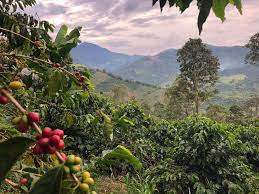
A Guide to Understanding Coffee From Around the World
Share

Colombia
Brazil
Brazil is the country that produces the most coffee in the world. Because the coffee is grown at lower altitudes, the flavor profiles tend to be more nutty and earthy. You likely will not find wild, fruity coffees in low altitude regions like Brazil. The earthy, balanced profile is also prevalent in Brazil because most of the coffee is naturally processed. Brazilian coffees often work best as a solid base for a blend.
Central America
The coffees of the Central American countries tend to not differentiate substantially from one country to the next. The key word to describe them would be "balanced." You know you are going to get a flavorful, solid cup of coffee. It won't be overly sweet or acidic and should be pleasing enough for everyone to enjoy. But you may not get those "crazy" flavors from other regions. Guatemalans do tend to stand out for their complexity. Additionally, Mexican coffees which are grown at the Southern end of the country, have many similarities with other Central American coffees.
Ethiopia
A personal favorite of many coffee aficionados and the birthplace of coffee, Ethiopia's high elevations make for some incredibly fruity and vibrant coffees. These coffees often have clear, distinct notes of blueberry or strawberry. The mouthfeel is often described as tea-like, which is not everyone's "cup of tea," but to those who appreciate it, nothing beats Ethiopian coffee. If one wants to be able to clearly taste the notes described on the bag, Ethiopian coffee gives you the best chance for that clarity.
Kenya
Kenyan coffees are best known for their acidity and citric fruit notes, but surprisingly they also can be more balanced and savory like some South American coffees. You never quite know what you are going to get with them, which is what makes Kenyans so fun and exciting! Some coffee drinkers love fruity coffee but want a fuller body, and Kenyans are best positioned to satisfy these drinkers.
Sumatra (Indonesia)
Sumatran coffees are great for coffee drinkers who prefer bold, rich coffees with a heavy mouthfeel and a spiciness. They are complex and earthy, with typical notes of dark chocolate and tobacco (just like our own Kokowagayo). Sumatrans are a bit polarizing; either you love them or hate them. For us, we can't hate any coffees and have found delicious Sumatrans. They often work best as part of a blend, but that doesn't preclude enjoying single origins.
Other Regions
Great coffee is not limited to the countries and regions above. India has been producing some interesting coffees for some time now. One of the best coffees we've ever tasted was from Nepal. Vietnam produced the second-most coffee in the world, though most of it is Robusta coffee. While the best coffee tends to originate from certain parts of the world, great coffee can be grown almost anywhere, provided it is farmed with careful attention, solid science and respect for the earth and surrounding environment and community.
